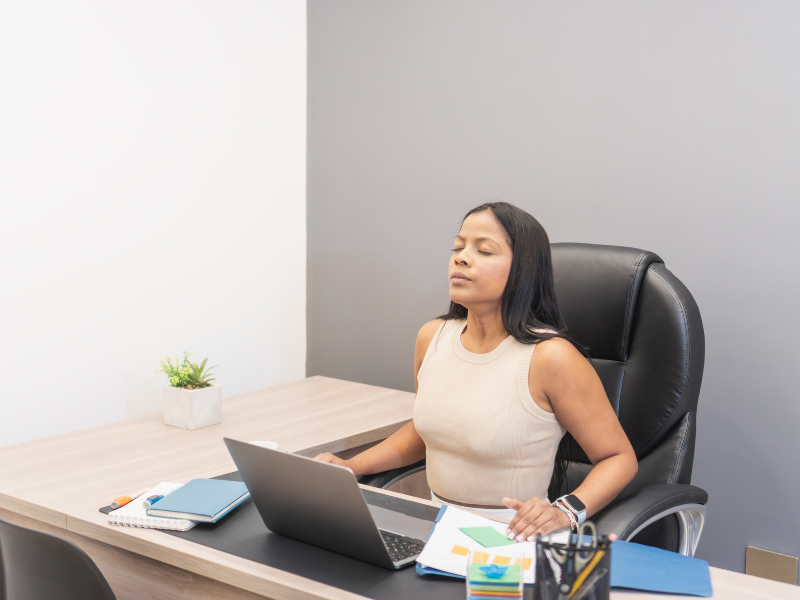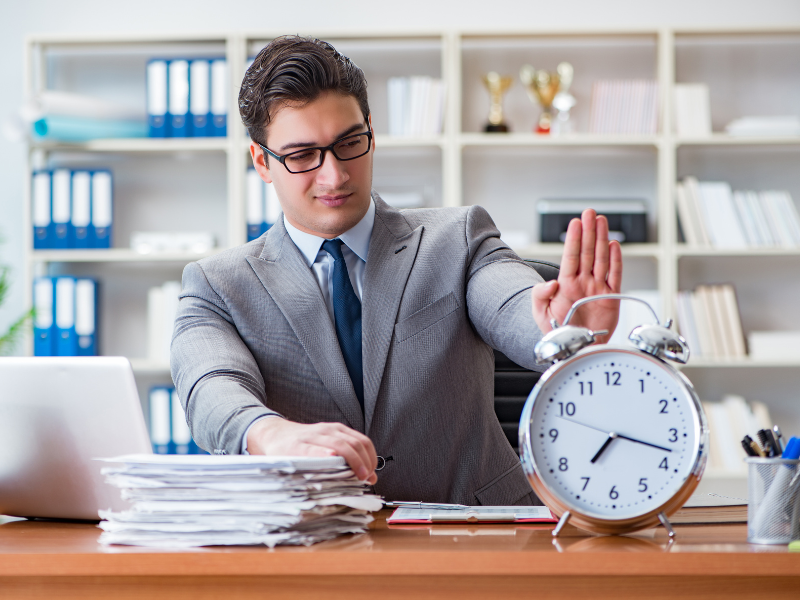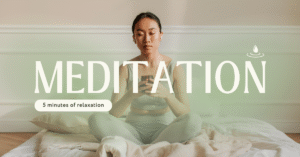Stress relief techniques for busy professionals play a crucial role in maintaining focus and well-being in today’s high-stress, fast-paced work environments. With constant deadlines, nonstop meetings, and overflowing inboxes, it’s easy for stress to accumulate, often leading to emotional distress at work and leaving you feeling drained long before the day ends.
The encouraging part is that you don’t need major lifestyle overhauls to manage stress effectively. Simple, practical strategies such as brief desk stretches, short moments to relax at work, and smart time management can help you regain calm and control.
In this guide, we’ll walk through the 7 best relaxation techniques for busy professionals that can be easily incorporated into your daily routine to improve focus, energy, and overall well-being.

Contents
ToggleHow Stress Affects Focus and Productivity?
Even though stress often feels like just a normal part of a busy workday, in high-stress, fast-paced work environments, it gradually drains your energy and makes it harder to stay focused. Ignoring stress can slowly undermine your productivity and motivation, leaving you feeling overwhelmed and mentally exhausted.
Here’s what can happen when stress is left unchecked:
- Lower focus and concentration: You lose track of tasks, reread emails, and struggle with clarity.
- Decreased productivity: Simple tasks take longer, and efficiency drops.
- Energy drain: Constant pressure leaves you mentally and physically exhausted.
- Emotional distress at work: Stress unchecked can affect mood, motivation, and relationships.
- Weaker decision-making: Overthinking and confusion replace clear, confident choices.
That’s why stress relief techniques for busy professionals are more than just “nice to have”, they’re essential for staying sharp, calm, and effective at work.
7 Stress Relief Techniques for Busy Professionals
1. Practice Quick Desk Stress Relief
Work pressure piling up? A little desk stress relief can go a long way and it only takes a few minutes. Try these simple resets right at your workstation:
- 60-second deep breathing: inhale deeply, hold, and exhale slowly.
- Neck & shoulder stretch: roll gently to release built-up tension.
- Mini eye break: close your eyes for 30 seconds to refresh focus.
- Hand & wrist stretch: flex your fingers and rotate your wrists.
- Positive reset: pause and think of one good thing that happened today.
These quick habits keep you calm, focused, and ready for the next task.

2. Take Short Breaks to Relax at Work
Even the busiest schedules have room for micro-breaks. In fact, stepping away for just a few minutes can help you relax at work and recharge your energy. Here are quick ways to make it happen:
- Walk it out: A 2–3 minute walk around the office boosts circulation and clears your head.
- Screen disconnect: Look away from your laptop or phone to reduce eye strain.
- Stretch it out: Stand, reach up, or bend gently to release tension.
- Sip & reset: Drink water or herbal tea slowly, focusing only on the moment.
- Mini-mindfulness: Close your eyes and take 3 calming breaths before diving back in.
These tiny pauses may feel small, but they keep your focus sharp and prevent burnout.

3. Try Simple Relaxation Techniques for Busy Professionals
You don’t need an hour-long session to feel calm. Just a few minutes of relaxation techniques for busy professionals can lower stress and clear your mind. Here are quick ones you can try anytime:
- Mindful breathing: Focus only on your breath for 1–2 minutes to reset.
- Guided imagery: Imagine a peaceful place like a beach or garden to release tension.
- Mini-meditation: Close your eyes and repeat a calming phrase like “I’m in control.”
- Body scan: Quickly notice and relax any tense muscles, starting from your shoulders.
- Gratitude pause: Think of one thing you’re thankful for today to shift your mood.
These simple tools fit right into your workday without slowing you down.

4. Manage Your Time Better to Reduce Stress
Effective time management for stress management is more than just checking off tasks—it’s about taking control of your day so stress doesn’t control you. By organizing your time smartly, you can protect your focus, energy, and peace of mind.
Here are practical strategies that really work:
- Prioritize smartly: Tackle the 2–3 most important tasks first instead of trying to do everything at once.
- Pomodoro technique: Work in focused 25-minute blocks with short breaks to recharge your mind.
- Set boundaries: Politely say no when your schedule is full, and protect your downtime.
Even small improvements in how you manage your time can make your workday feel lighter and keep stress levels under control.

5. Build a Healthy Daily Routine
Stress can pile up quickly when basic self-care gets ignored. Creating a simple, healthy daily routine can make a big difference in managing long-term stress and boosting overall well-being.
Here are some small but effective habits:
- Prioritize sleep: Aim for 7 to 8 hours each night to refresh your mind and body.
- Move your body: Even a 15-minute walk or short stretch session helps release tension.
- Stay hydrated: Drinking enough water keeps your energy levels stable.
- Eat balanced meals: Nutritious foods fuel your focus and prevent energy crashes.
By including these habits into your day, even in a busy schedule, you can stay calmer, more focused, and better equipped to handle work challenges.

6. Create Support Systems at Work
No one has to tackle workplace stress alone. Having a solid support system at work can make even the busiest days feel more manageable. When challenges pile up, knowing there’s someone to share the load with can make all the difference.
Here are some practical ways to build your professional support network:
- Talk with colleagues: Chatting with a coworker over coffee about a tricky project can lighten your mental load and even spark new ideas.
- Delegate tasks: Trust your team instead of trying to do everything yourself. Sharing responsibilities doesn’t just reduce stress; it helps everyone grow.
- Connect with mentors or networks: Joining a professional group or finding a mentor can provide advice, encouragement, and a fresh perspective on challenges.
For example, one of my friends in a fast-paced marketing firm started a weekly “check-in chat” with her team. Just 15 minutes to discuss workloads and brainstorm solutions helped her feel supported and prevented burnout. So, having supportive people around not only lowers stress but also creates a more positive, collaborative, and motivated work environment.

7. Set Clear Work–Life Boundaries
Finding a balance between work and personal life is crucial to keeping stress under control. Many busy professionals feel like they’re “always on,” which quickly drains both energy and focus. Setting clear boundaries helps protect your well-being and keeps you productive.
Here are some practical ways to create healthy boundaries:
- Limit after-hours emails: Turn off notifications or set specific times to check messages. Even just a 30-minute email pause after work can help your mind relax.
- Set realistic limits: Be honest about how much you can handle in a day and communicate it clearly with colleagues or your manager. Saying no sometimes isn’t just okay, it’s necessary.
- Prioritize personal downtime: Schedule moments for hobbies, family, or simple relaxation. For instance, taking a short evening walk or reading a book for 20 minutes can help you recharge and come back to work refreshed.
By respecting your own limits and sticking to these boundaries, you can reduce stress, improve focus, and enjoy a healthier workflow both during work hours and in your personal life.

Conclusion
Managing stress doesn’t have to feel overwhelming, even for professionals with jam-packed schedules. The stress relief techniques for busy professionals shared in this article are simple, practical, and easy to fit into your daily routine.
Start with just one or two small practices. For example, you might try a quick stretch at your desk or a short mindfulness break between meetings. Over time, these little habits can make a noticeable difference in your focus, energy, and overall well-being.
Remember, it’s the small, consistent steps that really add up. By taking care of yourself and using these strategies, you can stay calm, focused, and productive even when work is intense and deadlines are tight.
Frequently Asked Questions (FAQs)
How to relieve stress quickly?
Even on the busiest days, it’s possible to lower stress in just a few minutes. Try desk stress relief techniques like 60-second deep breathing, neck stretches, or mini-mindfulness pauses. Short walks, disconnecting from screens, or sipping water mindfully also help you reset instantly.
What are the best stress management techniques for busy people?
The best approaches combine quick relaxation, time management, and healthy routines. Our article highlights 7 stress relief techniques for busy professionals, including desk exercises, short breaks, mindfulness practices, effective time management, building routines, creating support systems, and setting work–life boundaries.
How to cope with being too busy?
Prioritize tasks, set realistic limits, and say no when needed. Incorporate micro-breaks, short mindfulness exercises, and clear work–life boundaries to prevent overwhelm. Even small adjustments in your day can make a big difference.
What exercises release stress?
Simple movements can ease tension quickly. Try shoulder rolls, neck stretches, wrist flexes, or a short walk around the office. Even 1–2 minutes of mindful breathing or guided imagery can release mental stress and refresh your focus.
Can diet impact stress levels?
Yes, stay hydrated, eat balanced meals, and avoid excessive caffeine or sugar to boost energy and reduce stress.




